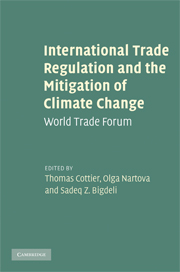Book contents
- Frontmatter
- Contents
- Contributors
- List of figures
- List of tables
- List of abbreviations
- Preface
- PART I Climate change mitigation: scientific, political and international and trade law perspectives
- PART II Climate change mitigation and trade in goods
- PART III Trade in renewable energy sources
- PART IV Climate change mitigation and trade in services
- PART V Climate change and technology transfer, investment and government procurement: legal issues
- 14 International transfer of technologies: recent developments in the climate change context
- 15 TRIMS and the Clean Development Mechanism — potential conflicts
- 16 Balancing investors' interests and global policy objectives in a carbon constrained world: the interface of international economic law with the Clean Development Mechanism
- 17 Procurement policies, Kyoto compliance and the WTO Agreement on Government Procurement: the case of the EU green electricity procurement and the PPMs debate
- 18 Procurement and the World Trade Organization: purchase power or pester power?
- PART VI Institutional challenges and the way forward
- Index
- References
14 - International transfer of technologies: recent developments in the climate change context
from PART V - Climate change and technology transfer, investment and government procurement: legal issues
Published online by Cambridge University Press: 04 August 2010
- Frontmatter
- Contents
- Contributors
- List of figures
- List of tables
- List of abbreviations
- Preface
- PART I Climate change mitigation: scientific, political and international and trade law perspectives
- PART II Climate change mitigation and trade in goods
- PART III Trade in renewable energy sources
- PART IV Climate change mitigation and trade in services
- PART V Climate change and technology transfer, investment and government procurement: legal issues
- 14 International transfer of technologies: recent developments in the climate change context
- 15 TRIMS and the Clean Development Mechanism — potential conflicts
- 16 Balancing investors' interests and global policy objectives in a carbon constrained world: the interface of international economic law with the Clean Development Mechanism
- 17 Procurement policies, Kyoto compliance and the WTO Agreement on Government Procurement: the case of the EU green electricity procurement and the PPMs debate
- 18 Procurement and the World Trade Organization: purchase power or pester power?
- PART VI Institutional challenges and the way forward
- Index
- References
Summary
Introduction
International legal aspects of technology transfer have been subject to international negotiations, and to scholarly debate among international lawyers for decades. In the 1970s and 1980s, technology transfer was an important matter in the discussions on a so-called ‘new international economic order’ and provisions on the transfer of deep seabed mining technology were a major stumbling block for the entry into force of the United Nations Convention on the Law of the Sea (UNCLOS). In the context of protecting the global environment, technology transfer has returned to the agenda of political decision-makers as an important item. As in those previous discussions, the transfer of environmentally sound technology raises important issues of law and policy, but the answers may not be the same as those given previously. Compared to the discussions on a ‘new international economic order’, the setting of the ‘contemporary international economic order’ is more than ever characterised by an increasing number of bilateral free trade agreements and bilateral investment treaties and by the overarching importance of the World Trade Organization (WTO). Another important difference from those earlier discussions is that today a dozen important international agreements for the protection of the environment have been negotiated and have entered into force, all of them containing provisions obliging developed countries to transfer technologies to developing countries in order to assist them in protecting the environment.
- Type
- Chapter
- Information
- International Trade Regulation and the Mitigation of Climate ChangeWorld Trade Forum, pp. 283 - 297Publisher: Cambridge University PressPrint publication year: 2009



